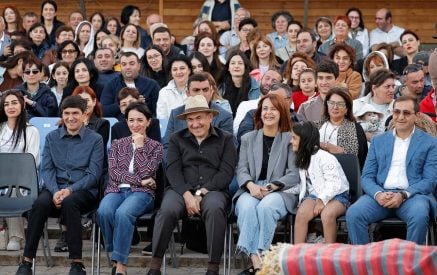Perhaps, few of today’s young people have seen the film “Lenin in 1918”, which was screened in 1939. The work of talented film director and the actors, basically, was the propaganda for Bolshevik cannibalism and Stalinism (or maybe deep “encrypted” flagellation?). Interestingly, the doom of the film reflects the attitude towards history, which was and, unfortunately, still is stuck in the post-Soviet societies. In the preliminary version of the film, Stalin plays almost equal role next to the main character.
The film was re-edited in 1956, and the “father of the nations” is almost not seen.
Generally, there are also no episodes with Bukharin, because this Bolshevik executed by shooting in 1938, in the film screened next year, was presented as one of the organizers of the conspiracy against Lenin. So it is now, too, isn’t it? In 3-4 years, the anti-heroes become heroes, and vice versa, whereas the Bolshevik “principled” wheel is in rotation again, and the roles are changing again, and so endlessly.
Read also
But the most typical episodes of the film is the dialogue between Lenin and Gorky. When the writer intercedes for an arrested professor, the proletariat leader was skeptical about this request, if arrested, then he must have done something counter-revolutionary (what does it mean, “he is a good man”? Which is his political line?” “Earlier, he probably was hiding our people, and now, perhaps, our enemies”). Gorky assures, “He is a man of sciences,” to which the Bolshevik leader give a very specific response, “No, no, no, Alex Maksimovich, there are no such people.”
In other words, a person cannot be simply a man of sciences: either he must be from Bolsheviks team, or the latter’s rival, the enemy. In those times, the political field was also “clear”. There was the “white” with the Bolsheviks, sometimes people say, “next to the people” because the Bolsheviks are the same “people”, and the “black” against the Bolsheviks (“the people”).
Maybe, you would say that the moment is critical, it was in the civil war, the task of the country’s being or not being was to be decided. However, it seems to me that either we would accept that the life of all people and the history of all nations consists of critical moments, destructions and disasters, whose end is never seen, or vice versa, trying to lay the stone on the stone without the feeling of constant alarm.
For the second case, it should be accepted that there might simply be people of sciences, just doctors, teachers and stonemasons, who do not fit in any “political line”. They certainly have some views, but they do not fit in the template of “Bolshevik-counter-Bolshevik”, “revolutionist-counter-revolutionist”, “black and white”. Those who are in the so-called “struggle”, have hard time to imagine it. But, on the other hand, if one takes the “proletariat punishing sword”, later he is able to put it down.
To the point, today is the day of Soviet political prisoners.
ARAM ABRAHAMYAN
























































